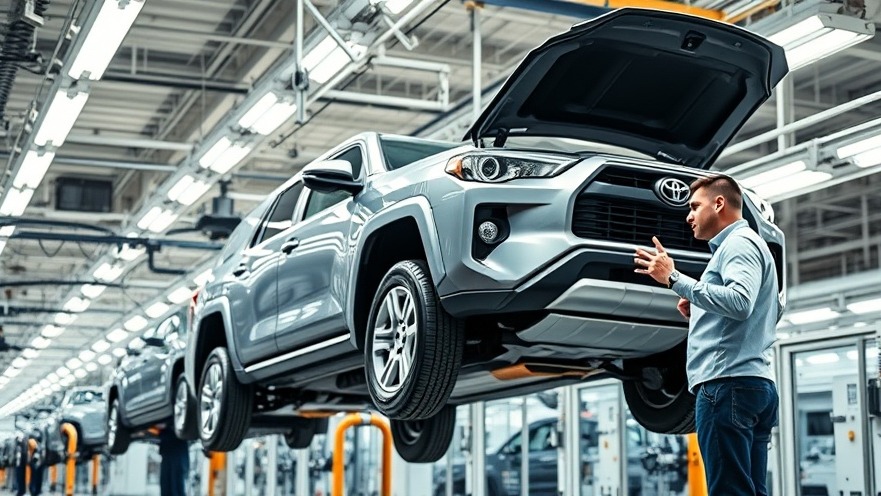
The Trouble with Hybrid Cars: Lexus’s Missed Opportunity
In the automotive world, making the right vehicle choices is key to sales success. Lexus recently found itself in a predicament when it discontinued the LC500 hybrid model due to abysmally low sales—only eight units sold in the United States. While the traditional LC500 with a roaring V8 engine remains popular with buyers, the attempted hybrid version reportedly fell flat, underscoring a significant disconnect between manufacturer expectations and consumer desires.
In 'Toyota and Lexus Just Shut Down Production and Fired Their Workers,' the video dives into the challenges faced by major car manufacturers and their implications for the auto industry, prompting us to analyze these insights more deeply.
The failure of the LC500 hybrid highlights how hybrid technology, despite its popularity in many markets, does not automatically translate to every vehicle segment. Buyers invested in a luxury sports vehicle often prioritize speed and performance over fuel economy. The hybrid version, introduced with a V6 engine, did not resonate with drivers who were accustomed to the powerful acceleration offered by the V8. Lexus's miscalculation in assuming that a hybrid would appeal to the performance-oriented market clearly did not go as planned.
Nissan's Turmoil: Closing Factories and Partnerships
On another front, Nissan has been facing its own trials. Reports indicate that the company plans to close its oldest factory located outside Japan, after almost 60 years of operation, a move that reveals the extent of the turmoil the brand is undergoing. As they prepare to shut down plants, including one in Mexico, the stakes are rising for Nissan's future. The company has also discussed dissolving its partnership with Mercedes-Benz, as they struggle to sell their Infiniti models.
These challenges indicate a deeper problem within Nissan's strategy, particularly regarding market demands and consumer preferences. When a manufacturer has to close its factories producing affordable vehicles, it raises questions about the organization's ability to pivot quickly to meet market trends.
Mercedes-Benz: A Struggling Shift Towards Electric Vehicles
While Lexus and Nissan navigate their respective challenges, Mercedes-Benz has been battling its own issues, especially with electric vehicles (EVs). The luxury automaker significantly slashed prices on its EV lineup amidst disappointing demand, indicating that electric luxury cars may not appeal as broadly as anticipated. With price drops of nearly $15,000 on certain models, the company seeks to stimulate sales while recognizing a significant disconnect between their product offerings and consumer interest.
Recent moves have shown Mercedes suggesting they are 'aligning with customer and market demand,' President and CEO of the company acknowledged their challenges and adjusted accordingly. However, the struggle to maintain production effectively signifies broader issues in transitioning to an electric future.
California's Solution: Apprenticeship Programs for Auto Technicians
As the industry grapples with hybrid roadblocks, Nissan's factory closures, and failing electric vehicle sales, California is taking proactive steps to address another pressing issue: a shortage of skilled auto technicians. The state's new apprenticeship program potentially sets a precedent by directly addressing the mechanic shortage that many dealers face. Offering on-the-job training, this program encourages aspiring technicians to gain hands-on experience while being paid, rather than having to commit to extensive schooling before entering the workforce.
This is particularly crucial as vehicles become more technologically advanced and the complexity of hybrids and EVs increases. As dealer service departments report significant backlogs, addressing this shortage with practical solutions might be vital for the automotive industry's future.
Conclusion: The Automobile Industry's Changing Landscape
In summary, the challenges faced by prominent manufacturers like Lexus, Nissan, and Mercedes-Benz illustrate the complexities of consumer preferences in today’s market. From disappointing hybrid sales to factory closures and difficulties in shifting toward electric vehicles, the automotive industry is certainly in a transitional phase. California's response to the mechanic shortage could be a critical step toward balancing these evolving market dynamics.
For automobile owners, staying informed about these industry changes might help make better decisions regarding car purchases and maintenance needs. Whether you're interested in hybrids or luxury EVs, knowing what's happening in the market is essential.
 Add Row
Add Row  Add
Add 




Write A Comment